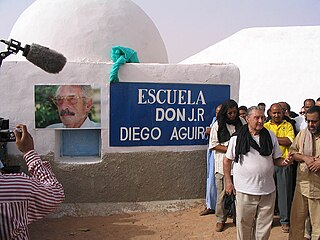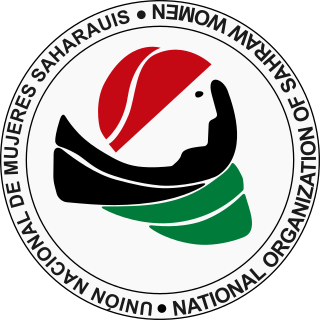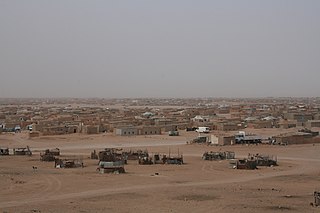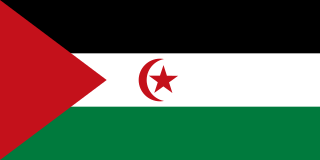Telecommunications in Western Sahara include radio, television, fixed and mobile telephones, and the Internet.

Bir Lehlou is an oasis town in north-eastern Western Sahara, 236 km from Smara, near the Mauritanian border and east of the border wall, in Polisario Front-held territory. It has a pharmacy, a school and a mosque. It is the head of the 5th military region of the Sahrawi Arab Democratic Republic and was the factual temporary capital of SADR until Tifariti became the temporary capital in 2008. It is also the name of a Daïra of the Wilaya of Smara, in the Sahrawi refugee camps.

The National Union of Sahrawi Women is the women's wing of the Polisario Front. It was created in 1974, and claims to have 10,000 members, divided between the Sahrawi refugee camps, the Liberated territories, the Moroccan-occupied part of Western Sahara and the Sahrawi diaspora.

Tifariti is an oasis town and the temporary capital of the Sahrawi Arab Democratic Republic, located in north-eastern Western Sahara, east of the Moroccan Berm, 138 km (86 mi) from Smara and 15 km (9 mi) north of the border with Mauritania. It is part of what Polisario Front calls the Liberated Territories and Morocco call the Buffer Zone. It has been the de facto temporary capital of the Sahrawi Arab Democratic Republic since the government moved there in 2008 from Bir Lehlou. It is the headquarters of the 2nd military region of the SADR.

Canal 24 Horas is a Spanish free-to-air television channel owned and operated by Televisión Española (TVE), the television division of state-owned public broadcaster Radiotelevisión Española (RTVE). It is the corporation's all-news television channel, and is known for its 24-hour rolling news service and its live coverage of breaking news.

The Sahrawi National Council or Sahrawi Parliament is the legislature of the Sahrawi Arab Democratic Republic. Its structure and competences are guided by the Constitution of the Sahrawi Arab Democratic Republic (SADR). The present speaker since 2020 is Hamma Salama.

The foreign relations of the Sahrawi Arab Democratic Republic (SADR) are conducted by the Polisario Front, which maintains a network of representation offices and embassies in foreign countries.
Sahara Press Service is the multi-lingual official press agency of the Sahrawi Arab Democratic Republic. The agency mainly report government-related news and current Sahrawi affairs, both from the liberated and occupied territories of Western Sahara, and the Sahrawi refugee camps in Tindouf, Algeria.

The Sahrawi refugee camps, also known as the Tindouf camps, are a collection of refugee camps set up in the Tindouf Province, Algeria in 1975–76 for Sahrawi refugees fleeing from Moroccan forces, who advanced through Western Sahara during the Western Sahara War. With most of the original refugees still living in the camps, the situation is among the most protracted in the world.

The following outline is provided as an overview of and topical guide to the Sahrawi Arab Democratic Republic:
The Sahrawi Arab Democratic Republic (SADR) was proclaimed by the Polisario Front on 27 February 1976, in Bir Lehlu, Western Sahara. SADR claims sovereignty over the entire territory of Western Sahara, a former Spanish colony; however, at present the SADR government controls approximately 20–25% of the territory it claims. It calls the territories under its control the "Liberated Territories", whilst Morocco claims its territories as the "Southern Provinces".

The Western Sahara national football team represents Western Sahara (SADR), a disputed territory, in association football. Controlled by the Sahrawi Football Federation, they are members of World Unity Football Alliance for non-FIFA-affiliated nations.

Mexico–Sahrawi Republic relations are the current and historical relations between Mexico and the Sahrawi Arab Democratic Republic (SADR). Mexico recognized the SADR on 8 September 1979.

Cuba–Sahrawi Arab Democratic Republic relations refers to the current and historical relations between the Republic of Cuba and the Sahrawi Arab Democratic Republic (SADR). Cuba recognized the SADR on 20 January 1980, formal diplomatic relations were established on 30 January 1980. A Sahrawi embassy was opened in Havana in April 1980, and the Cuban embassy in Algiers was accredited to the SADR.

The Sahrawi Arab Democratic Republic, also known as the Sahrawi Republic and Western Sahara, is a partially recognized state, recognized by 46 UN member states and South Ossetia, located in the western Maghreb, which claims the non-self-governing territory of Western Sahara, but controls only the easternmost one-fifth of that territory. Between 1884 and 1975, Western Sahara was known as Spanish Sahara, a Spanish colony. The SADR is one of the two African states in which Spanish is a significant language, the other being Equatorial Guinea.
Radio Nacional de la Republica Árabe Saharaui Democrática is the state-owned public radio broadcaster of the Sahrawi Republic.

Sahrawi Arab Democratic Republic–Spain relations are the current and historical relations between the Sahrawi Arab Democratic Republic and Spain.
The transition to high-definition television is a process by which standard-definition (SD) television signals are upgraded to a high-definition (HD) format. In this process, channels usually either simulcast their HD signals alongside the existing SD signals or broadcast exclusively in HD. The transition to the latter is often referred to as the standard-definition television switch-off.












